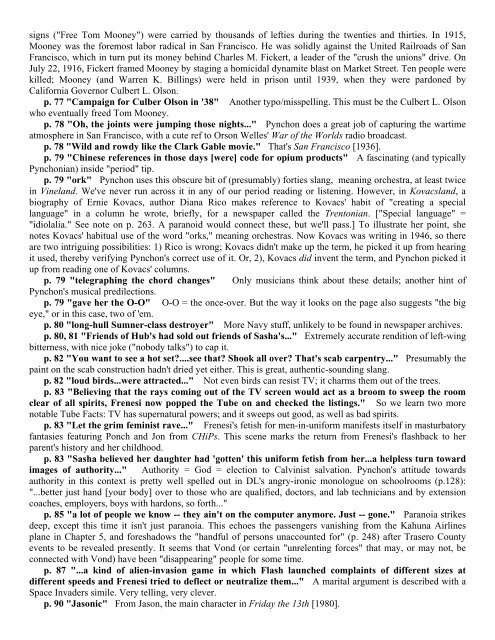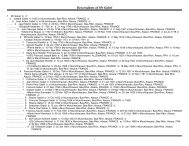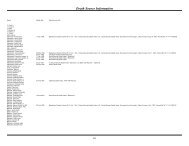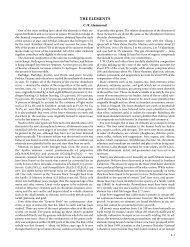You also want an ePaper? Increase the reach of your titles
YUMPU automatically turns print PDFs into web optimized ePapers that Google loves.
signs ("Free Tom Mooney") were carried by thousands of lefties during the twenties and thirties. In 1915,<br />
Mooney was the foremost labor radical in San Francisco. He was solidly against the United Railroads of San<br />
Francisco, which in turn put its money behind Charles M. Fickert, a leader of the "crush the unions" drive. On<br />
July 22, 1916, Fickert framed Mooney by staging a homicidal dynamite blast on Market Street. Ten people were<br />
killed; Mooney (and Warren K. Billings) were held in prison until 1939, when they were pardoned by<br />
California Governor Culbert L. Olson.<br />
p. 77 "Campaign for Culber Olson in '38" Another typo/misspelling. This must be the Culbert L. Olson<br />
who eventually freed Tom Mooney.<br />
p. 78 "Oh, the joints were jumping those nights..." Pynchon does a great job of capturing the wartime<br />
atmosphere in San Francisco, with a cute ref <strong>to</strong> Orson Welles' War of the Worlds radio broadcast.<br />
p. 78 "Wild and rowdy like the Clark Gable movie." That's San Francisco [1936].<br />
p. 79 "Chinese references in those days [were] code for opium products" A fascinating (and typically<br />
Pynchonian) inside "period" tip.<br />
p. 79 "ork" Pynchon uses this obscure bit of (presumably) forties slang, meaning orchestra, at least twice<br />
in <strong>Vineland</strong>. We've never run across it in any of our period reading or listening. However, in Kovacsland, a<br />
biography of Ernie Kovacs, author Diana Rico makes reference <strong>to</strong> Kovacs' habit of "creating a special<br />
language" in a column he wrote, briefly, for a newspaper called the Tren<strong>to</strong>nian. ["Special language" =<br />
"idiolalia." See note on p. 263. A paranoid would connect these, but we'll pass.] To illustrate her point, she<br />
notes Kovacs' habitual use of the word "orks," meaning orchestras. Now Kovacs was writing in 1946, so there<br />
are two intriguing possibilities: 1) Rico is wrong; Kovacs didn't make up the term, he picked it up from hearing<br />
it used, thereby verifying Pynchon's correct use of it. Or, 2), Kovacs did invent the term, and Pynchon picked it<br />
up from reading one of Kovacs' columns.<br />
p. 79 "telegraphing the chord changes" Only musicians think about these details; another hint of<br />
Pynchon's musical predilections.<br />
p. 79 "gave her the O-O" O-O = the once-over. But the way it looks on the page also suggests "the big<br />
eye," or in this case, two of 'em.<br />
p. 80 "long-hull Sumner-class destroyer" More Navy stuff, unlikely <strong>to</strong> be found in newspaper archives.<br />
p. 80, 81 "Friends of Hub's had sold out friends of Sasha's..." Extremely accurate rendition of left-wing<br />
bitterness, with nice joke ("nobody talks") <strong>to</strong> cap it.<br />
p. 82 "You want <strong>to</strong> see a hot set?....see that? Shook all over? That's scab carpentry..." Presumably the<br />
paint on the scab construction hadn't dried yet either. This is great, authentic-sounding slang.<br />
p. 82 "loud birds...were attracted..." Not even birds can resist TV; it charms them out of the trees.<br />
p. 83 "Believing that the rays coming out of the TV screen would act as a broom <strong>to</strong> sweep the room<br />
clear of all spirits, Frenesi now popped the Tube on and checked the listings." So we learn two more<br />
notable Tube Facts: TV has supernatural powers; and it sweeps out good, as well as bad spirits.<br />
p. 83 "Let the grim feminist rave..." Frenesi's fetish for men-in-uniform manifests itself in masturba<strong>to</strong>ry<br />
fantasies featuring Ponch and Jon from CHiPs. This scene marks the return from Frenesi's flashback <strong>to</strong> her<br />
parent's his<strong>to</strong>ry and her childhood.<br />
p. 83 "Sasha believed her daughter had 'gotten' this uniform fetish from her...a helpless turn <strong>to</strong>ward<br />
images of authority..." Authority = God = election <strong>to</strong> Calvinist salvation. Pynchon's attitude <strong>to</strong>wards<br />
authority in this context is pretty well spelled out in DL's angry-ironic monologue on schoolrooms (p.128):<br />
"...better just hand [your body] over <strong>to</strong> those who are qualified, doc<strong>to</strong>rs, and lab technicians and by extension<br />
coaches, employers, boys with hardons, so forth..."<br />
p. 85 "a lot of people we know -- they ain't on the computer anymore. Just -- gone." Paranoia strikes<br />
deep, except this time it isn't just paranoia. This echoes the passengers vanishing from the Kahuna Airlines<br />
plane in Chapter 5, and foreshadows the "handful of persons unaccounted for" (p. 248) after Trasero County<br />
events <strong>to</strong> be revealed presently. It seems that Vond (or certain "unrelenting forces" that may, or may not, be<br />
connected with Vond) have been "disappearing" people for some time.<br />
p. 87 "...a kind of alien-invasion game in which Flash launched complaints of different sizes at<br />
different speeds and Frenesi tried <strong>to</strong> deflect or neutralize them..." A marital argument is described with a<br />
Space Invaders simile. Very telling, very clever.<br />
p. 90 "Jasonic" From Jason, the main character in Friday the 13th [1980].







